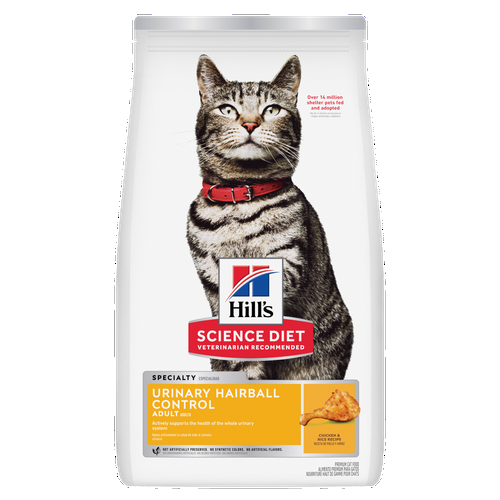
-
Find the right food for your petTake this quiz to see which food may be the best for your furry friend.Find the right food for your petTake this quiz to see which food may be the best for your furry friend.Featured products
 Hill's Science Diet Adult Oral Care Chicken, Brown Rice & Barley Recipe Dog Food
Hill's Science Diet Adult Oral Care Chicken, Brown Rice & Barley Recipe Dog FoodClinically proven kibble technology to reduce plaque & tartar build-up
Shop Now Adult 7+ Small & Mini Chicken & Brown Rice Recipe Dog Food
Adult 7+ Small & Mini Chicken & Brown Rice Recipe Dog FoodFor the unique nutritional needs of mature Small & Mini dogs
Shop Now Adult Small & Mini Lamb Meal & Brown Rice Recipe Dog Food
Adult Small & Mini Lamb Meal & Brown Rice Recipe Dog FoodFor the faster metabolism of Small & Mini dogs
Shop NowFeatured products Adult Urinary Hairball Control Chicken & Rice Recipe Cat Food
Adult Urinary Hairball Control Chicken & Rice Recipe Cat FoodActively supports the health of the whole urinary system
Shop Now Adult Indoor Chicken Recipe Cat Food
Adult Indoor Chicken Recipe Cat FoodSupports energy level and beautiful fur in indoor cats
Shop Now Hill's Science Diet Adult Sensitive Stomach & Skin Dog Food
Hill's Science Diet Adult Sensitive Stomach & Skin Dog FoodHighly digestible recipe, gentle on stomachs. Nourishes skin & promotes a lustrous coat
Shop Now -
Featured articles
 My Pet Ate a Lizard — What Should I Do?
My Pet Ate a Lizard — What Should I Do?Learn what to do if your pet eats a lizard, including whether they can be toxic and symptoms to keep an eye on when they've swallowed one.
Read More 15 Pet-Friendly Cities Ideal for a US Road Trip
15 Pet-Friendly Cities Ideal for a US Road TripCheck out our list of pet-friendly U.S. cities that are excellent travel options, offering off-leash dog parks and pet-friendly restaurants & hotels.
Read More Easy DIY Dog & Cat Toys: Nine of Our Favorites
Easy DIY Dog & Cat Toys: Nine of Our FavoritesBrowse this comprehensive guide for several of our favorite DIY dog and cat toys that are sure to put a little pep in your pet's step.
Read More -


You love your dog, and you want to provide him with the best nutrition to keep him in top shape. But when it comes to portion size or the number of snacks you share per day, you're not really sure whether you're giving him too much. Just like humans, there are many health risks for dogs associated with overfeeding your dog. The Association for Pet Obesity Prevention reports that a staggering 54 percent of dogs in the United States are considered overweight or obese. Consumption of too much dog food or treats may lead to obesity, so it's important to know your pet's eating habits are keeping him healthy.

How Much to Feed Your Dog
The best way to figure out how much to feed your dog is to talk with your veterinarian. Before your next appointment, measure the average serving size of your wet or dry food and mark down how often (and at what times) your dog eats. Also keep a log of how often you feed him snacks, and what kind of food he's given for treats, including rawhide, peanut butter or table scraps.
It helps to bring all of the nutritional labels from your dog's food to an appointment so your vet knows how many calories your dog is consuming and what ingredients are in his food. Doing this will help your vet make sure your pup is receiving the vitamins, nutrients and minerals he needs for a balanced meal plan.
In the meantime, most retail food brands offer suggested portion sizes based on a dog's current weight. Just be aware that if your dog is currently already overweight, the guidelines may not be as helpful as you'd like. Don't reduce your dog's food drastically. Instead, visit your vet for their opinion.
Signs You're Overfeeding Your Dog
Unfortunately, there aren't many obvious signs that you're feeding your pet too much. Monique Udell, an animal behaviorist from Oregon State University, tells National Geographic that "most people wouldn't know if they're overfeeding their dog. The more they see other people's dogs of similar weight, it becomes harder and harder to recognize." You may notice an overweight dog lacks energy or has trouble exercising, but that isn't always the case.
If he's nearby, call your dog over and do a physical examination. If you can easily feel your dog's ribs (but not see them), and he has a "waist" behind his chest, your dog is likely at an ideal weight for his body. Ribs covered by a thick pad of fat or a waist that is barely visible are visual clues that your pet is overweight.
If you have multiple dogs, they might need different kinds of food for their ages and breeds. It's possible the same type of kibble could be overfeeding dog A while giving dog B just the right amount of nutrition.


Tasty Tips

Risks Associated with Overfeeding Your Dog
There are many short and long term risks for feeding your pet more than he should be eating. According to the Banfield Pet Hospital's 2017 State of Pet Health® report, overfeeding a dog leads to increased medical bills for pet parents. The report suggests that dog parents with an overweight pet spend 17 percent more in healthcare costs than those whose dogs are at a healthy weight. In addition, they spend almost 25 percent more on medications.
The amount spent on medical needs isn't the only alarming thing. What's worse are health risks that overfed pets face. The State of Pet Health study reports that the prevalence of other diseases, such as arthritis and breathing problems, has spiked as more dogs are becoming overweight. The decreased mobility from excess weight also makes healing much more difficult if your dog faces an injury like a fractured limb. Finally, obese dogs tend to lead more sedentary lives, making exercise more difficult to introduce and putting them at risk for heart disease.
You love your pet and would do anything to keep him from getting ill. Don't let another day of potential overfeeding slip by. Take some time to monitor your pet's baseline eating habits, and talk to your vet to see if any changes need to be made. Yes, he may beg or give you those eyes, but dogs don't have the same internal conscious telling them that they're full and will often eat well beyond what they should. It is up to you to help curb your dog's weight by feeding him proper meal sizes.


Erin Ollila believes in the power of words and how a message can inform—and even transform—its intended audience. Her writing can be found all over the internet and in print, and includes interviews, ghostwriting, blog posts, and creative nonfiction. Erin is a geek for SEO and all things social media. She graduated from Fairfield University with an M.F.A. in Creative Writing. Reach out to her on Twitter @ReinventingErin or learn more about her at http://erinollila.com.
Related products

For the unique nutritional needs of mature Small & Mini dogs

Clinically proven kibble technology to reduce plaque & tartar build-up

Improves everyday ability to get up & go

For the faster metabolism of Small & Mini dogs
Related articles

Your dog's coat and skin are a big part of your dog's overall health. Ensure you keep your dog's coat healthy, by following these simple tips.

Understand the role that Omega-6 and Omega-3 fatty acids play in your dog's overall health, and how you can ensure they are getting enough.

Discover how the field of dog science is giving us more and more insights into the inner workings of our furry best friends.

Learn basic steps & precautions for treating a cut on your dog, including what you can put on the cut, and when you should take them to the vet.

Put your dog on a diet without them knowing
Our low calorie formula helps you control your dog's weight. It's packed with high-quality protein for building lean muscles, and made with purposeful ingredients for a flavorful, nutritious meal. Clinically proven antioxidants, Vitamin C+E, help promote a healthy immune system.
Put your dog on a diet without them knowing
Our low calorie formula helps you control your dog's weight. It's packed with high-quality protein for building lean muscles, and made with purposeful ingredients for a flavorful, nutritious meal. Clinically proven antioxidants, Vitamin C+E, help promote a healthy immune system.

